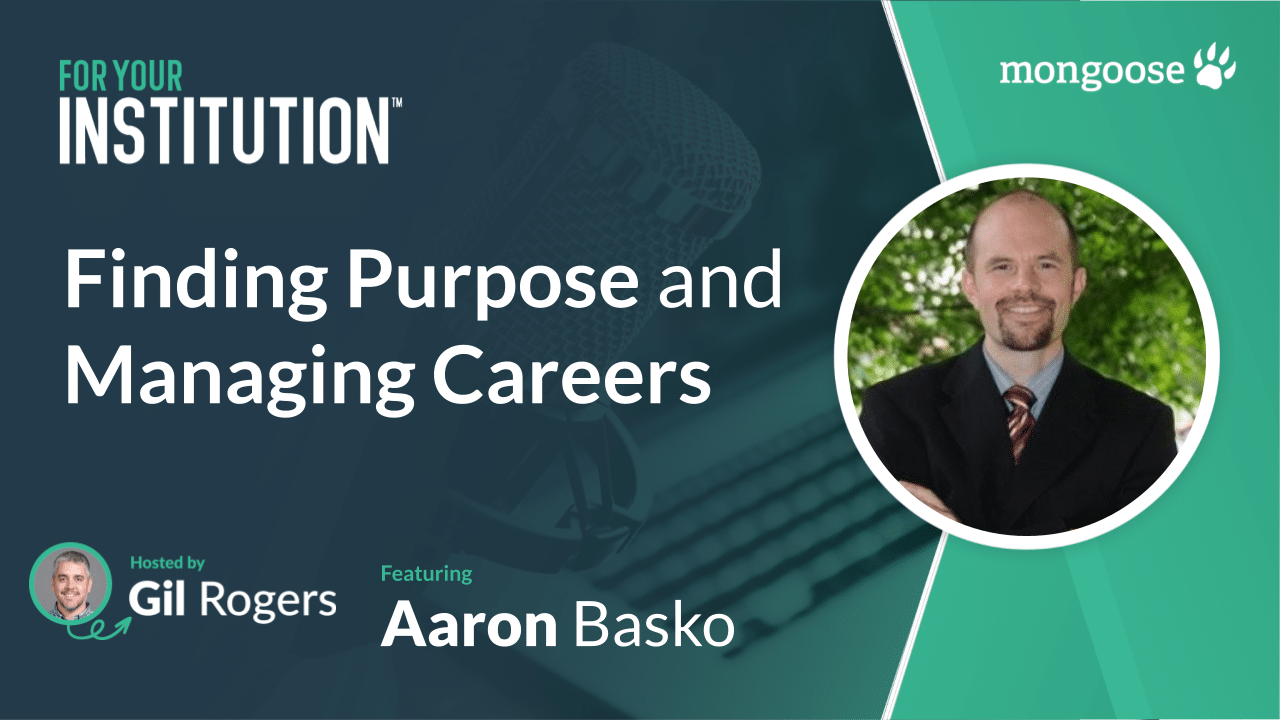Managing Careers with Purpose and Passion

In this episode of FYI we interview author Aaron Basko about his new book focused on helping students and professionals make the most out of their current and future careers.
Subscribe for Updates
Don’t miss a single episode—subscribe today for the latest content!
Who is Aron Basko?
Aaron Basko is a recognized leader in higher education enrollment management as well as the author of the new book, Find Your Purpose: Manage Your Career.
In this Episode
Aaron Basko, author of the new book Find Your Purpose: Manage Your Career, joins FYI host Gil Rogers to talk about the secrets to aligning your innate talents with your professional life. Aaron, with his wealth of experience in higher education, shares how to empower not only students but also seasoned professionals to refine and capitalize on their strengths for a rewarding career.
They also discuss the art of personal branding, the nuances of strategic decision-making, and how to approach resumes and interviews. This episode is rich with strategies to navigate career development even when the going gets tough.
Listen to FYI on your favorite podcast platform!
Episode Transcript
Finding Purpose and Managing Careers with Aaron Basko
Publishing Date: April 16, 2024
[00:00:00] Gil: Welcome back to FYI, the For Your Institution Podcast, presented by Mongoose. I’m your host, Gil Rogers. And I am ecstatic today to be joined by author, Aaron Basko, and talking about his new book, Find Your Purpose, Manage Your Career.
Aaron, welcome!
[00:00:24] Aaron: Thanks so much, Gil. I really appreciate you having me on.
[00:00:27] Gil: Awesome. Well, Aaron, before we hop in, you know, I’ve got a copy of your book here. I’ve had a chance to read it. I think I posted it on LinkedIn, a very easy read, full of practical ideas and great advice. But before we hop in and talk about the content of the book, I’d love to hear about the content of you.
And for those who might not know you or have been connected with you, what you do in your day job, how you got here, what inspired you to take this leap, in many respects, and then we can hop in from there.
[00:00:54] Aaron: That sounds great. Sure. Well, to give a little bit of background on me, so I work in higher education. I’m almost 30 years in higher education now, almost all of that working with admissions, financial aid, and career services. I’ve been at five different institutions, which has been great because I’ve been able to see this wide range of how schools work and what they look for in students and, really, what they can do to help students in different ways.
And over that time period, I’ve picked up a lot of seeing students in action, what works for them, what schools are looking for in those students. And I’ve also really loved the time that I’ve spent with career services and seeing how students develop. And really, that’s what I think got me into the field of higher education, was to see students who have this amazing potential and you’re helping them take that next step in their journey to become like who they imagine themselves being, right?
And so, as I have spent more and more time in the field, I really gravitated towards this idea of, how can I be of help to students as they are moving forward and trying to launch into their future? And so, I really have put a lot of those years of experience into this book, Find Your Purpose, Manage Your Career, to help students, but really anybody, to say, “Okay, how do I know, like, really who am I and what it is that I was, sort of, built to do? And if I know that, how can I leverage that in really practical ways to help me get a great career outcome that I’m really excited about?”
[00:02:14] Gil: Yeah, and I think it shows through in the content of the book. I will say I think that, for higher ed institutions, specifically, this is, kind of, a, probably, a must-deliver or must-present to students, as they’re getting ready to graduate and lean into. But even before that, maybe in sophomore, junior year, when they’re thinking about internships and paths, what are they looking to do and accomplish?
I was having a conversation a couple weeks ago with a colleague and we were talking about how college search sites are managed and developed, right? And they’re all filtering services where a student can say, “I want to major in this. Here are the colleges in this state that have this major,” right? And it’s less about what’s your major and it’s more about what’s your career path is really the question that should be asked.
And I think what you do here is help people to, kind of, decide and understand and discover where they’re meant to be and what they’re meant to do. And I think there’s a certain level of sometimes you, kind of, try to ignore what you’re hardwired to be and hardwired to do versus embracing it. And obviously, you want to develop and work on your weaknesses, but you also want to play to your strengths. And a lot of times, that comes with self-reflection and really thinking through it.
So, if nothing else, to our listeners, we’ll put a link to the book in our episode notes so that you can pick up a copy for yourself. Or if you work in career services at a college, maybe you think about doing this for your students, or if you have a class on career discovery, maybe you do it for your class. But I recommend taking a look because it’s definitely worth the time to dive in.
And one final thing, just as a point of order for our listeners, you know, typically on FYI, we’re talking about higher ed-related issues, right? We’ve talked a lot about the FAFSA rollout. We’ve talked about student perspectives and these sorts of things. We’re taking a break from that today and really focusing on you, the listener, in many respects.
Aaron, you’ve worked in this space for, you said, approaching 30 years. So, I’m going to say you started when you were 15 years old. There’s a lot of conversation in higher ed, specifically, with admissions counselors, financial aid counselors, student services professionals, student affairs professionals, and transition in their careers, right? And I think one of the things that we’ve always said is that people are drawn to careers in higher education because they are people-focused and they want to support others, well, just like people who work in health professions and other areas, right? It’s not necessarily about making a million bucks every year. It’s about making an impact and making a difference.
And so, even though the book applies to, really, everyone, right, we will focus on higher ed professionals specifically because I think you and I both have pretty close connections there and ties to what they might be thinking. So, to the higher ed professional who’s, kind of, stressed out right now, this time of year is stressful for everybody, there’s variety of reasons, what are some key takeaways and things that you can think about from the exercises that you outline in the book that might be helpful for folks as they’re sitting up at night thinking, “Is this where I need to be or want to be?”
[00:05:02] Aaron: Absolutely. That totally makes sense. And I think one of the great things about the way the book is structured, it’s really two pieces together, right? It’s first it’s self-discovery and self-understanding, but then it’s very practical pieces. And it’s this whole idea of you’re managing your career for life, right? You’re not making one career decision. Maybe you’ve gotten into higher ed because you’re a young graduate and you thought, “It’d be great to work for my alma mater and get a couple of years,” or whatever else. But then you’re learning about yourself and you’re saying, “Wait a minute. Is this really what I want to do?”
And so, the book is really filled with tools to help you, sort of, manage your options, right? So, to look and say, “Okay, if I really know who I am, if I know, sort of, what I’m built to do, can I… if I go in this direction, is that going to give me more of that or less of that,” right? And you can manage your different options as you go through your life, whether it’s right now and you’re thinking about making a career shift, or, 10 or 15 years from now, you go back to that touchstone of really who you are, which I call your design. And you can always go back to that and say, “Wow, this is the skill that I’ve always used, maybe, since I was a little kid, right? And now, I can think about what fields I can apply that to so that I get, sort of, maximum success.”
And so, I think for that young professional, this idea of, “Okay, first of all, I need to know who I am, but once I do that, I can figure out where to apply that to different areas and say, ‘Oh, hey, if I go in this direction, I’m going to get more of what I love to do and what I’m really designed to do, right? And I’ll get more joy out of doing that.’” So, I think it’s that kind of long-term career guide to help you do that. So, that’s why I put so many really specific, like, assessment type pieces, things for reflection to help you really hone in on what that is so that you can use it for the long term.
[00:06:35] Cadence Ad: Grow your student community, help them stay, and encourage giving with Cadence, higher ed’s premier engagement platform from Mongoose. Designed exclusively for higher ed by higher ed professionals, Cadence helps you engage your audiences with the perfect balance of AI and personal connection.
Talk to students, parents, and alumni on their time and how they want. Empower your staff with integrated text and chat inboxes that gather all conversations in one place.
Reach out to learn more about how our best-in-class service, support, and integrations have helped colleges and universities like yours have smarter conversations. From text to chat, make every message count.
[00:07:19] Gil: Absolutely. What about the mid to late career person, right, that might be having that feeling of you can’t teach an old dog new tricks, right? Or, “This is all I know,” and they’re afraid to, kind of, take a dive into another industry or another vertical or even just another department, right? That jump from admissions to student affairs, for some people, is a pretty big leap, right? Because you go from traveling and outbound and marketing and sales to more supporting students and being on campus, right?
And so, there are always going to be concerns and challenges for those mid and later career professionals, but you also don’t want to be just stuck in a rut and stuck doing what you feel like, “Oh, this is what I’ve always done,” right? So, what are the recommendations, I guess, that you would make for folks that are in that bucket when it comes to taking advantage of what you outline in your book?
[00:08:10] Aaron: Yeah. Well, I think the great thing about, Find Your Purpose, it’s all built around this idea that there are really three keys to understand if you want to be able to manage your career long term, right? You need to know your design, which is, “What is it that I do amazingly well, right, and I’m really built to do?” Number two is knowing your desire, which is, “Okay, if I know what that skill is, who do I want to use it with, or what field do I want to use it on?” And number three is knowing your demand, which is like, who will actually pay you to do those things, right, which is pretty important.
But I think those mid-career people where they have an opportunity is that, that second piece, that desire area, right? So, in the book, I talk about, okay, like, think of yourself as a tool in a tool belt, right? So, if you’re a hammer, your job is to pound nails. But you can do that in lots of different places, right? You can build houses with that hammer. You can build bird houses with that hammer. You can, you know, hang pictures with it. It has the same function, but you can use it in different fields. And I think that, for the mid-career person, if you understand what that function is, you can say, “You know, what? That’s a skill that, yes, it works in this field that I’m currently working in, but it’s also highly valuable over here and over here. And if I can figure out, like, okay, well, who would pay me to take that skill into using this different field…”
I think mid-career people suddenly find that, “Wow, that opens my options, right? I don’t have to go from, like, okay, I’m doing this exact job to this slightly different job, right?” They say, “Wait a minute. I could go to this very different job on paper, but it’s using the same skills that I love to use and that I’m so strong at.” And I think that gives that mid-career person, like, this sense of freedom, that they have things that they can do that they can apply in other areas and still get great value.
[00:09:40] Gil: Yeah, and I think I’m reminded of an old comic strip that I remember seeing that gets circulated every year when students are getting stressed out about the SATs, they’re getting stressed out about graduating and going to college. And it’s this whole, like, sorting element of the student who is the elephant gets an F because they can’t climb a tree as good as the monkey, right?
And I think, it’s that, you know, there’s always parallels between education and career, right? And I think that there’s something to be said about, just because you’ve been the elephant for so long but you’re meant to be a monkey, maybe you take that dive and you take on those roles, or if you’re really good at being an elephant but the jungle that you’re in doesn’t make you happy, switch to another jungle, right? And so, I think there’s a lot of opportunity there.
[00:10:23] Cadence Ad: Discover future applicants, delight enrolled students, and amplify fundraising performance with our Cadence engagement platform’s live chat and chatbot solutions. Designed exclusively for higher ed by higher ed professionals, Cadence helps you engage your audiences with the perfect balance of AI and personal connection.
We leverage proactive outreach and anticipate common roadblocks, knowing the most significant decisions often start with the smallest conversations. Our powerful AI ensures instant support and is smart enough to know exactly when to hand off to a staff member. And if nobody is available, it allows for easy followup.
Effortlessly integrated with your website, we proudly feature an industry-leading 85% self-service rate. It’s never been easier to make every message count.
[00:11:16] Gil: You did mention before that the book is, kind of, in two parts. And, you know, before we started the recording for today, I mentioned one of the things that I really like about the way it’s structured is the beginning is, you know, high-level self-discovery, work on yourself, understand what it is you want, how you want to do, but then the challenge would be, well, then what, right? Like, “I have all these great ideas. I understand who I am and I understand what I want to do, but now my resume is trash and I don’t know how to go to networking events and I can’t follow up because I’ve never done that before,” right?
And so, there’s really some practical elements that I’d love for you to dive in and give some of your top tips and recommendations for really applying the first half and using the skills in the second half.
[00:11:55] Aaron: Absolutely. I really wanted it to be that sort of comprehensive piece, right? Where, once you figured out what it is that you, you know who you are, you could walk right through it and it would help you with those pieces. That’s why I put in a whole section on managing your brand, right, and understanding who you are and how you make every piece of the presentation of who you are, from, you know, your resume, your cover letter, your interview, the way you look on social media, make all of those things match to tell the story about you.
And I put in pieces about understanding your own decision-making skill set, right, and the way that you make decisions and that, if you understand your type of decision-making, you can make more confident decisions.
And then I try to walk people directly through those very practical pieces, right? Okay. Here’s how you put together a resume that people are going to notice and that is consistent with your brand. Here’s how you make the most out of interview situations to make sure you’re telling a story that is compelling, right? Here’s how you do networking. Like, a lot of people are afraid of networking. It’s not scary, right? You can use informational interviews to be really powerful and connect with people that can really advocate for you.
So, it’s meant to be that, kind of, one stop for everything you need. That’s another reason that could be really interesting, I think, for colleges and universities, because I see this as a book and a resource that, for example, a career services office could give to students or could even give before those students enroll as something that’s a differentiator for them and say, “Okay, here are students who are finishing off high school. They’re about to make a major career decision. Take advantage of this knowledge and these resources to make sure you get on the right path. And we’re going to help you do that.”
[00:13:23] Gil: Yeah. And I see, like, a lot of companies do, you know, personality assessments for new hires so that they have a better understanding of how that person works and how to work with that person and how that person might work with others. And, you know, I’m a big fan of the Enneagram assessment, you outlined those in the book.
That’s why, you know, the company that I run outside of hosting podcasts is GR7 Marketing, and the seven is my Enneagram score, right? So, that’s why hosting podcasts and going to conferences and talking to people is something that I really enjoy doing, because it’s fun and out there and I’m talking and connecting. But, you know, it’s important to, kind of, understand yourself and know how you want to manage those relationships. Total aside, good section on how to present yourself on LinkedIn and manage that network. I know we’re both very active there. And there’s a huge untapped opportunity for many people, which simply create an account and never go, or use it just to scroll through and find news articles, which is, you know, one step, but there’s a lot more to it that you can do there. And so, those recommendations are extremely helpful.
So, I think higher ed institutions who are focused on really demonstrating that they want to connect their curriculum to career outcomes, sharing your book with students as early as possible to help them with, not just finding their major, but finding their career path, might be a really good opportunity to help, like you mentioned, differentiate, especially during a recruitment process when you’re trying to find ways truly differentiate from your competition, for lack of a better term.
So, final thoughts. I’d love for you to, kind of, share high-level, if there are, call it three takeaways that you want… you don’t have to stop at three if you don’t want to. But what are the three? What are the three takeaways that you would encourage people to get from your book, as they’re preparing for the next phases in their careers?
[00:15:06] Aaron: Absolutely. I would say, number one, this is a book about career management, right, which, career is not something that happens to you, right? Or, you make one decision about a major and you’re set, right? A career is something that you cultivate over your lifetime. And so, all the things we’ve been talking about, you know, LinkedIn opportunities, informational interviewing, these are opportunities for you to go through your life and manage this and really make the best of it as an active agent in your own work.
And I think that’s what the book is really all about, is to tell you, “Look, here’s how you can have all the tools in your tool belt that you need to be able to actively manage your career and reinvent yourself whenever you need to,” right?
I think the second thing is that, you really, in order to make a good fit and to understand how to make a good fit over time, you need to combine the three pieces, right, the three keys. You need to understand what it is you are naturally gifted at doing and have always loved to do. You need to understand where you want to apply that to an area that you have a passion about and can, you know, always be excited, always, you know, come back to over your lifetime. And then number three, you have to understand why that’s valuable to certain people and how to be able to present consistently to those people to do that.
And then, I think, really, the third thing is try to put as much extra value into this as possible so that it’s not just like, “Oh, okay, you pick a career,” right? But this is about understanding how to maximize your interaction opportunities, right? Again, how to make good decisions? How to constantly look at your options and weigh them and make a fit that is true to who you are? And I think that’s where the power comes from, right? If you know who you are, then you’re going to be able to maximize your potential and find something that’s going to be a great fit for you.
[00:16:41] Gil: Awesome. And I’ll add one final piece for listeners, is, there are a lot of books about, you know, self-help or a lot of books about building your career or marketing, or, you name the business vertical, there’s a book for it. I think where a lot of them fall short is they don’t have that practical where the rubber meets the road tangible recommendations that your book does. And I think that that’s something that for folks that are looking to manage their career, it’s not just the first half of the book, which is high-level self-discovery, which by itself is great, but a lot of times, people need that next level of tactical what-to-do and how-to-do-it type of approach, which I think is missed in a lot of these types of approaches when people put together these types of books.
So, Aaron, I appreciate you being on. The book is Find Your Purpose, Manage Your Career, and we’ll put all the resources and links to get your copy in the episode notes. So, thank you so much. Have a great day!
[00:17:33] Aaron: Thanks, Gil.[00:17:34] Gil: Bye.



